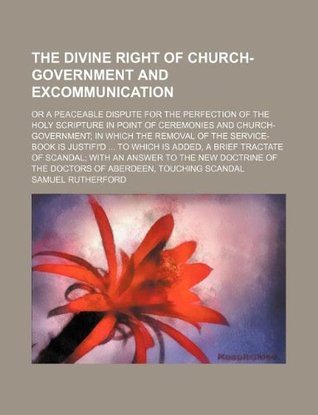This historic book may have numerous typos and missing text. Purchasers can download a free scanned copy of the original book (without typos) from the publisher. Not indexed. Not illustrated. 1646 Excerpt: ...build new Temples typicall to God, give new Lavjfs, write Canonick Scripture, as these men did by the Spirit ofprophecy nodoubr, not as Magistrates;forwhy, but they might sacrifice as Magistrates, ind why ihould Moses rather have committed the Priesthood, and the service of the Tabernacle due to him as a Magistrate, so to tAaron and his sonnes, as it should be unlawful! to him as a King, and unlawfull to Vzxiah to burn incense, and to sacrifice, and to doe the office of the Priest? If the Magistrate as the Magistrate doe all that the Priests are ro doe as Priests, and that by a supream principle, and radical! power in him, he ought not to cast off that which is proper to htm as a Magistrate.to take that which is iesle proper, he eastern the care and ruling of souls on the Priests, and reserveth the lesser part to himself, to rule the bodies of men with the Sword, all these are sufficiently answered before. Erastus. The King of Persia, Ezt& 7. appointed Judges to judge the people and teach them, but there is no Word of Excommunication, or any Ecclesiastics punishment, hut of death, imprisonment, fines; nor did Neherniah punijh the false Trophets With any other punishment. Iosephus speaketh nothing of it, nor Antiochus. Anst I shew before that there is forfeiting, and separation from the Congregation, Ezra 10. 8. THpO NIDI he stall be se parated from the Church. 2. Ifthe King of Persia appointed men to-judge and reach the people, why should he deny any judiea-. Hire at all f 3. Where ever Iosephus speaketh of rhe judging of the Priest, as he doth antiq. U if. c. 7. ant. 1.11. c. 8. /. 12. r. p. he trinteth at this. PS 171. Etastur.. Christ dischargeth his Disciples to exercise dominion, Christ Would'not condemne the adulterous Woman, nor judge betWee...
BUY NOW
Paperback, 240 pages
Published March 6th 2012 by Rarebooksclub.com
© 2025 Bibleportal.com 版权所有.

Rutherford was also known for his spiritual and devotional works, such as Christ Dying and drawing Sinners to Himself and his Letters. Concerning his Letters, Charles Spurgeon wrote: "When we are dead and gone let the world know that Spurgeon held Rutherford's Letters to be the nearest thing to inspiration which can be found in all the writings of mere men". Published versions of the Letters contain 365 letters and fit well with reading one per day.
Rutherford was a strong supporter of the divine right of Presbytery, the principle that the Bible calls for Presbyterian church government. Among his polemical works are Due Right of Presbyteries (1644), Lex, Rex (1644), and Free Disputation against Pretended Liberty of Conscience.
Samuel Rutherford was a Scottish Presbyterian theologian and author. He was one of the Scottish Commissioners to the Westminster Assembly.
Born in the village of Nisbet, Roxburghshire, Rutherford was educated at Edinburgh University, where he became in 1623 Regent of Humanity (Professor of Latin). In 1627 he was settled as minister of Anwoth in Galloway, from where he was banished to Aberdeen for nonconformity. His patron in Galloway was John Gordon, 1st Viscount of Kenmure. On the re-establishment of Presbytery in 1638 he was made Professor of Divinity at St. Andrews, and in 1651 Rector of St. Mary's College there. At the Restoration he was deprived of all his offices.
Rutherford's political book Lex, Rex (meaning "the law [and] the king" or "the law [is] king") presented a theory of limited government and constitutionalism. It was an explicit refutation of the doctrine of "Rex Lex" or "the king is the law." Rutherford was also known for his spiritual and devotional works, such as Christ Dying and drawing Sinners to Himself and his Letters.
... Show more